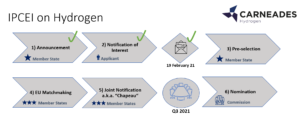IPCEI promotes Europe’s Hydrogen Initiative
Europe’s central value chains are to be strengthened
The European Commission targets to strengthen Europe’s competitiveness and global leadership in 6 strategic and future-oriented industrial sectors.
Hydrogen technologies and systems have by the European Commission’s Strategic Forum on “Important Projects of Common Interest” (IPCEI) been identified as one of them. Therefore, twenty-two EU member states and Norway signed the Manifesto for the Development of a European Value Chain for Hydrogen Technologies and Systems.
IPCEIs are joint investment efforts by cooperating European companies, supported by Member State government funding. The goal is to ensure a breakthrough of European cutting-edge technologies a scheme of nurturing them from research through to first industrial is deployed. Such scheme allows within in the rules of the WTO, that an IPCEI Project can be aided up to the funding gap or up to 100% of the eligible costs, whichever is lower.
As it is currently not planned by the European Commission to fund the IPCEI on Hydrogen directly, national funding as announced within the Member State’s National Hydrogen Strategy will be allocated to the undertakers participating in the IPCEI on Hydrogen.

With the focus on Germany, from the date of announcement of the call for expressions of interest in IPCEI project funding on the 11th of January until 19th February, an unexpected high number of 200 project outlines on hydrogen technologies and systems were submitted from all over the Country. This shows that there is a wide interest in the industry, especially since only five weeks were available for the drafting of a comprehensive twenty pages project outline with detailed forecasting financial data.
All submitted expression of interests are currently being scrutinized by the Federal Ministry of Economics and Technology for completeness and consistency. A tough preselection of the projects based on eligibility criteria and national budgetary aspects is to be expected.
Member State national based projects and those with a German investment value below EUR 10 million will not pass the defined thresholds depicted in the “Call for expressions of interest issued for IPCEI on hydrogen”. According to the regulations, an IPCEI cannot consist of a collection of independent projects. Each individual project of an integrated project must be complementary and necessary for the achievement of the important European objective pursued by the IPCEI.
Therefore, only a couple of specific projects finally might pass the threshold and finally qualify to become eligible for participation in the IPCEI on Hydrogen. Currently, the finding process is with the Member States and the applicants.
As part of the dialog between the applicant and the member states, the shortlisted project outlines are to be further refined and through adjustments and amendments to the project outlines. The establishment of the ICPEI can be perceived as burdensome and rather lengthy.
In summary, the qualification for the European IPCEI Hydrogen has high burdens and additionally, it is advisable for various reasons to consider the application of funding under other programs. Also, since the IPCEI procedure allows co-funding with other funds. The granting of a co-funding could be perceived as a differentiator in the qualification process of the IPCEI on Hydrogen.

